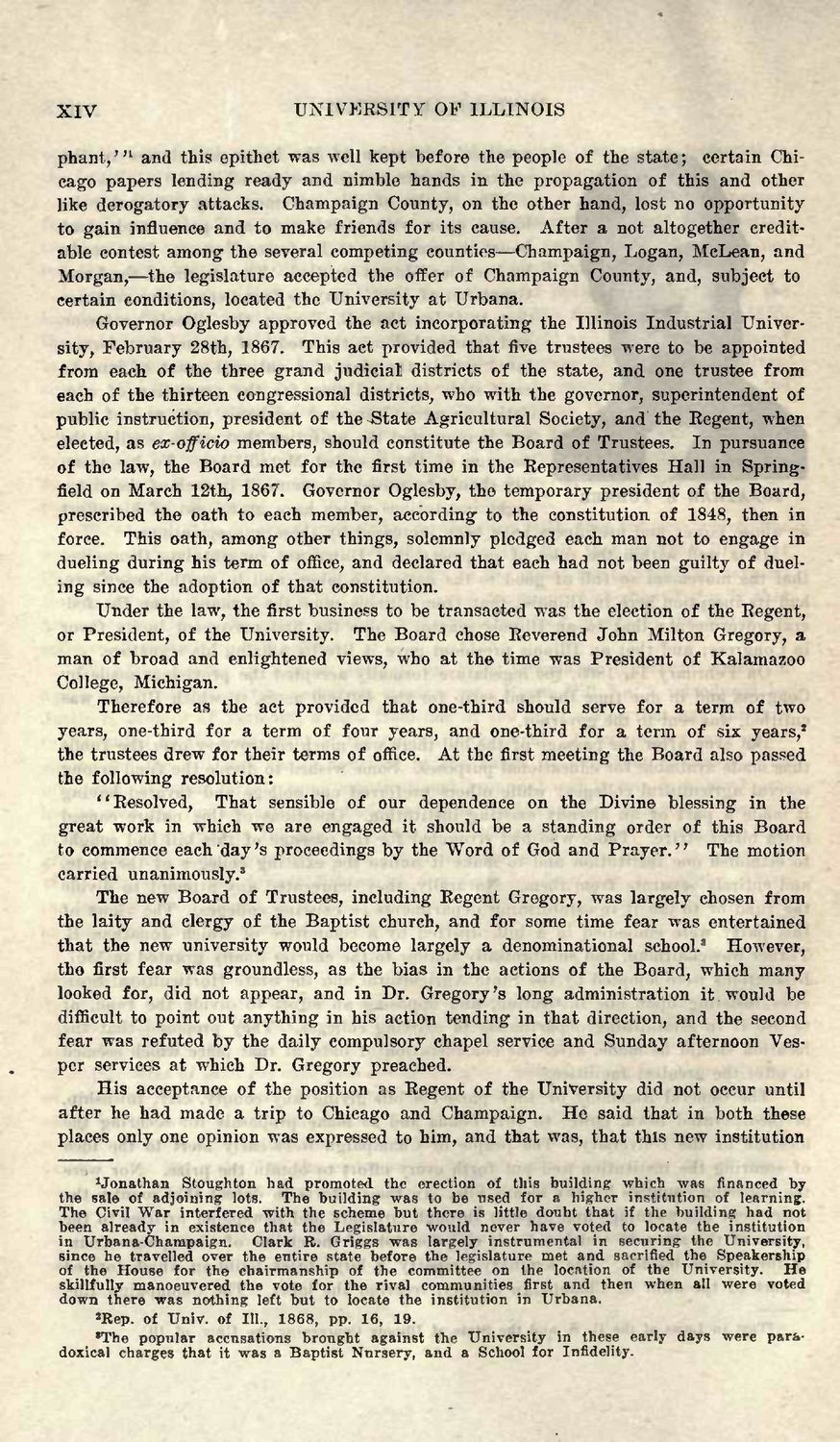| |
| |
Caption: Book - Early History of University (1916)
This is a reduced-resolution page image for fast online browsing.

EXTRACTED TEXT FROM PAGE:
XIV UN1VKHS1TY OV I L L I N O I S p h a n t , " 1 and this epithet was well kept before the people of the state; certain Chicago papers lending ready and nimble hands in the propagation of this and other like derogatory attacks. Champaign County, on the other hand, lost no opportunity to gain influence and to make friends for its cause. After a not altogether creditable contest among the several competing counties—Champaign, Logan, McLean, and Morgan,—the legislature accepted the offer of Champaign County, and, subject to certain conditions, located the University at Urbana. Governor Oglesby approved the act incorporating the Illinois Industrial University, February 28th, 1867. This act provided that five trustees were to be appointed from each of the three grand judicial! districts of the state, and one trustee from each of the thirteen congressional districts, who with the governor, superintendent of public instruction, president of the -State Agricultural Society, and the Eegent, when elected, as ex-officio members, should constitute the Board of Trustees. In pursuance of the law, the Board met for the first time in the Eepresentatives Hall in Springfield on March 12th, 1867. Governor Oglesby, the temporary president of the Board, prescribed the oath to each member, according to the constitution of 1848, then in force. This oath, among other things, solemnly pledged each man not to engage in dueling during his term of office, and declared that each had not been guilty of dueling since the adoption of that constitution. Under the law, the first business to be transacted was the election of the Eegent, or President, of the University. The Board chose Eeverend John Milton Gregory, a man of broad and enlightened views, who at the time was President of Kalamazoo College, Michigan. Therefore as the act provided that one-third should serve for a term of two years, one-third for a term of four years, and one-third for a term of six years,* the trustees drew for their terms of office. At the first meeting the Board also passed the following resolution: "Eesolved, That sensible of our dependence on the Divine blessing in the great work in which we are engaged it should be a standing order of this Board to commence each day's proceedings by the "Word of God and P r a y e r . " The motion carried unanimously.' The new Board of Trustees, including Eegent Gregory, was largely chosen from the laity and clergy of the Baptist chuTch, and for some time fear was entertained that the new university would become largely a denominational school.' However, tho first fear was groundless, as the bias in the actions of the Board, which many looked for, did not appear, and in Dr. Gregory's long administration it would be difficult to point out anything in his action tending in that direction, and the second fear was refuted by the daily compulsory chapel service and Sunday afternoon Vesper services at which Dr. Gregory preached. His acceptance of the position as Eegent of the University did not occur until after he had made a trip to Chicago and Champaign. H e said that in both these places only one opinion was expressed to him, and that was, that this new institution J o n a t h a n Stoughton had promoted the erection of this building which was financed by the sale of adjoining lots. The building was to be used for a higher institution of learning. The Civil "War interfered with the scheme but there is little douht that if the building had not been already in existence that the Legislature would never have voted to locate the institution in Urbana-Champaign. Clark R. Griggs was largely instrumental in securing the University, since he travelled over the entire state before the legislature met and sacrified the Speakership of the House for the chairmanship of the committee on the location of the University. He skillfully manoeuvered the vote for the rival communities first and then when all were voted down there was nothing left but to locate the institution in Urbana. s Rep. of Univ. of 111., 1868, pp. 16, 19. •The popular acensations brought against the University in these early days were paradoxical charges that it was a Baptist Nursery, and a School for Infidelity.
| |